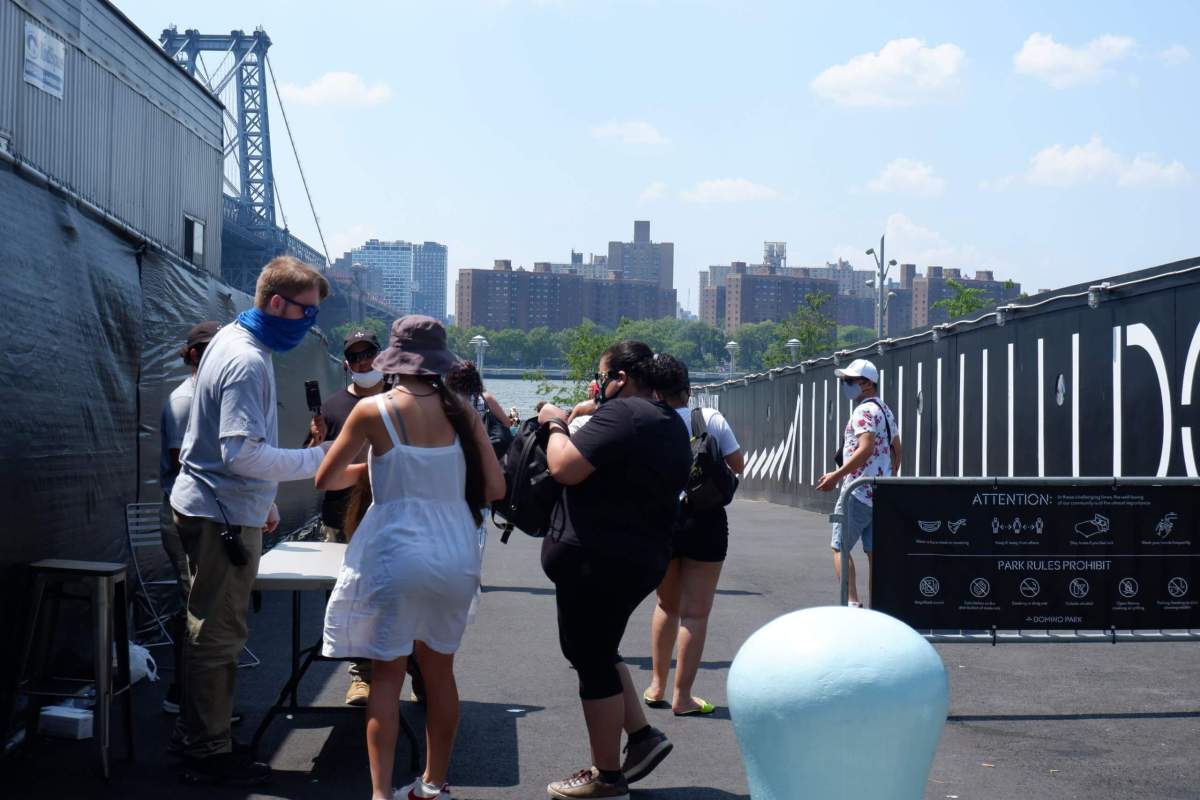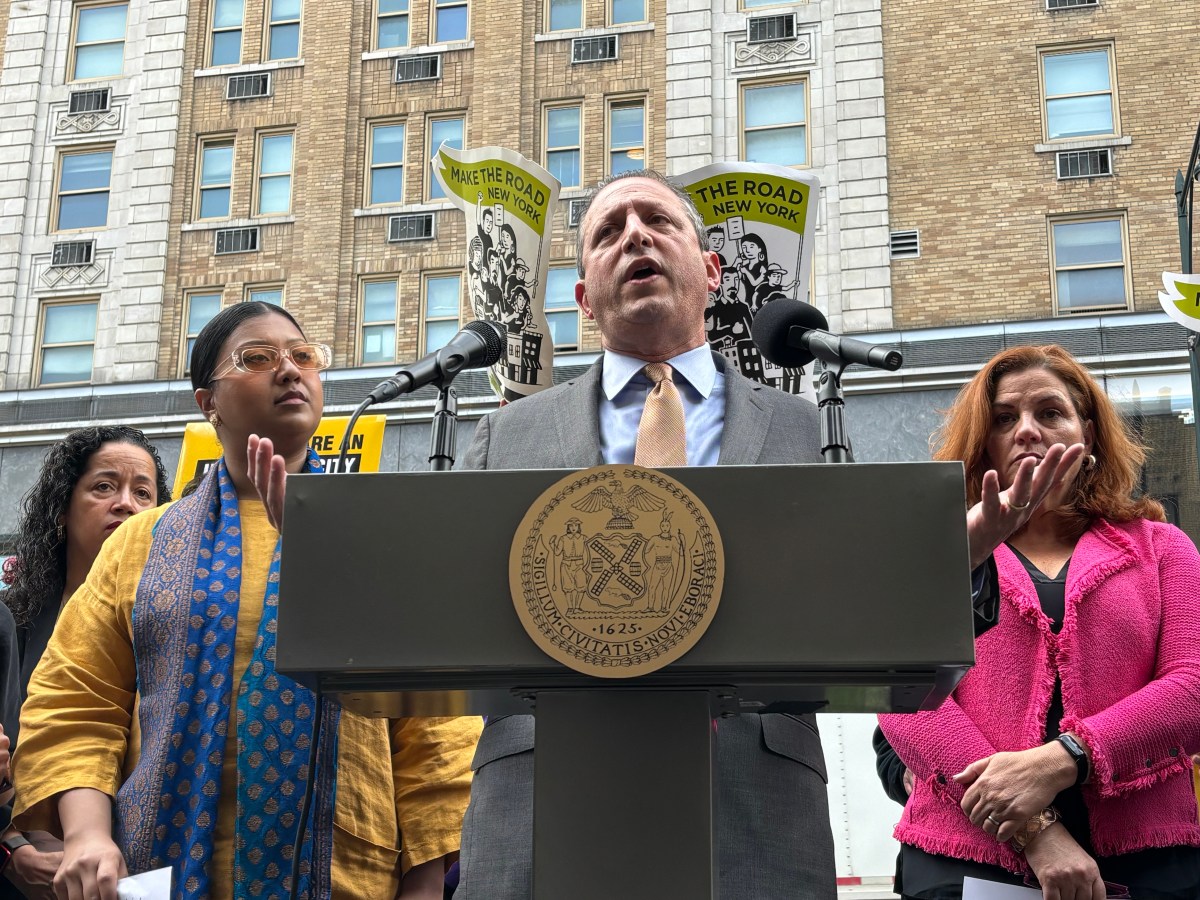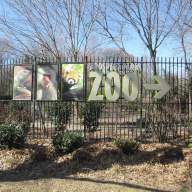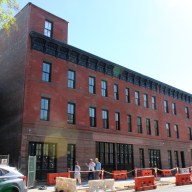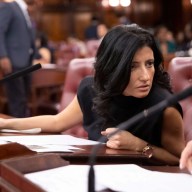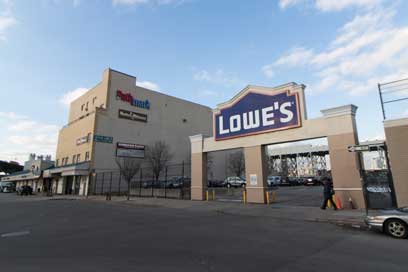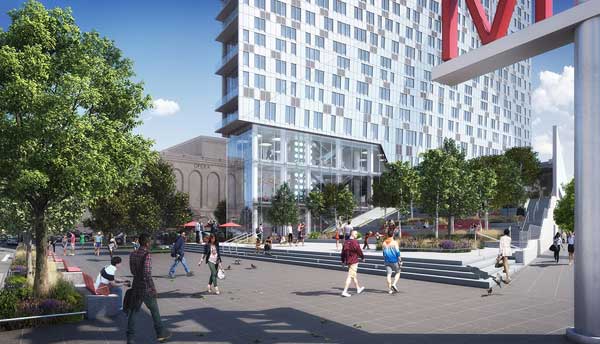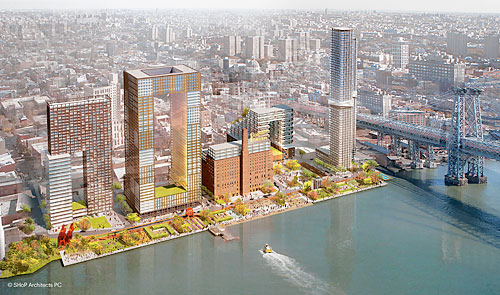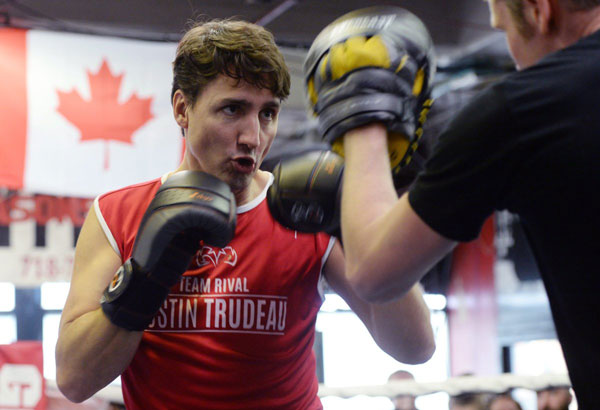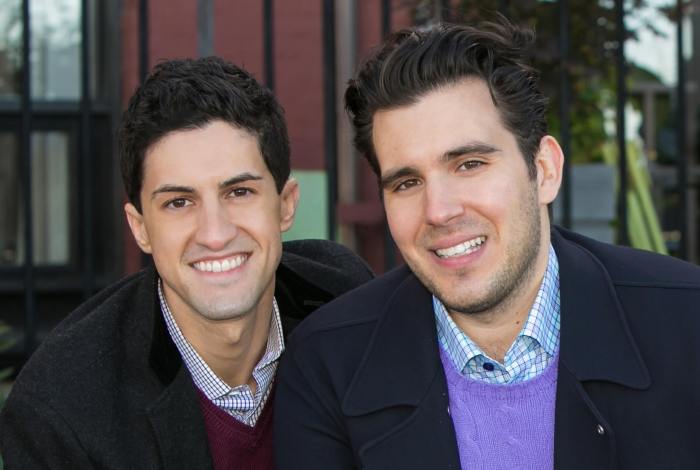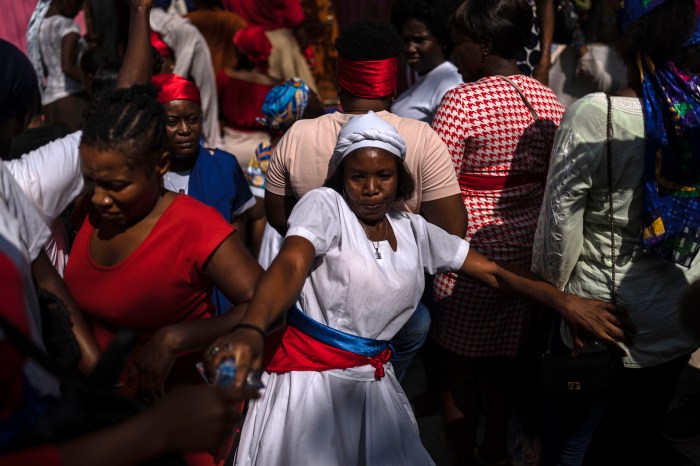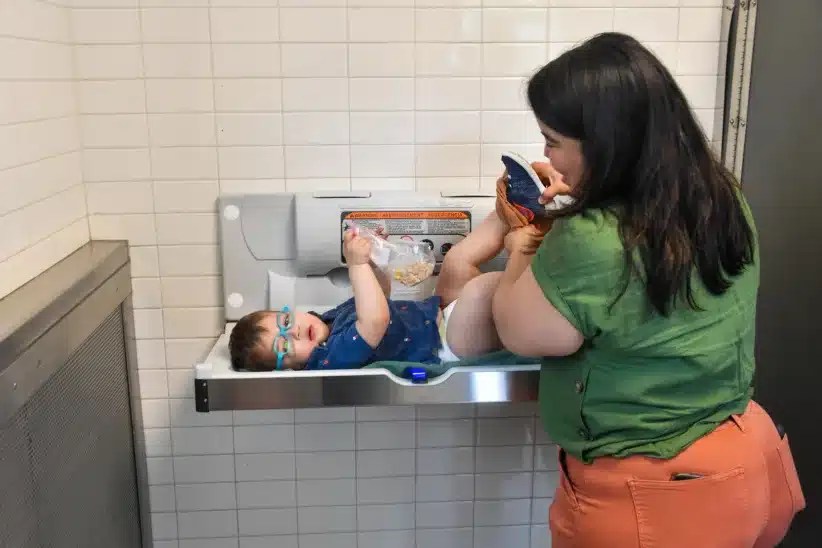The managers of the privately-owned Domino Park set up barricades and bag checks at entry points to the Williamsburg waterfront greenspace last month amid complaints of late-night parties and fireworks in the area, but the heightened security checks have raised concerns that the move will intimidate park goers, especially people of color.
“I feel like I will be targeted or my son’s father will be targeted, as opposed to my white counterparts who might feel safer — but what do you feel safer from,” said Tameeka Weekes a Black high school teacher from Canarsie at the park on a sweltering Sunday with her family on July 19.
The managers of the park — which is privately-owned by developer Two Trees — installed metal barricades and checkpoints in the beginning of June at each of the entrances along Kent Avenue and River Street between S. Fifth and Grand streets, inspecting some visitors’s bags, handing out masks, and in some cases turning people away for bringing in prohibited items, like outside booze and fireworks.
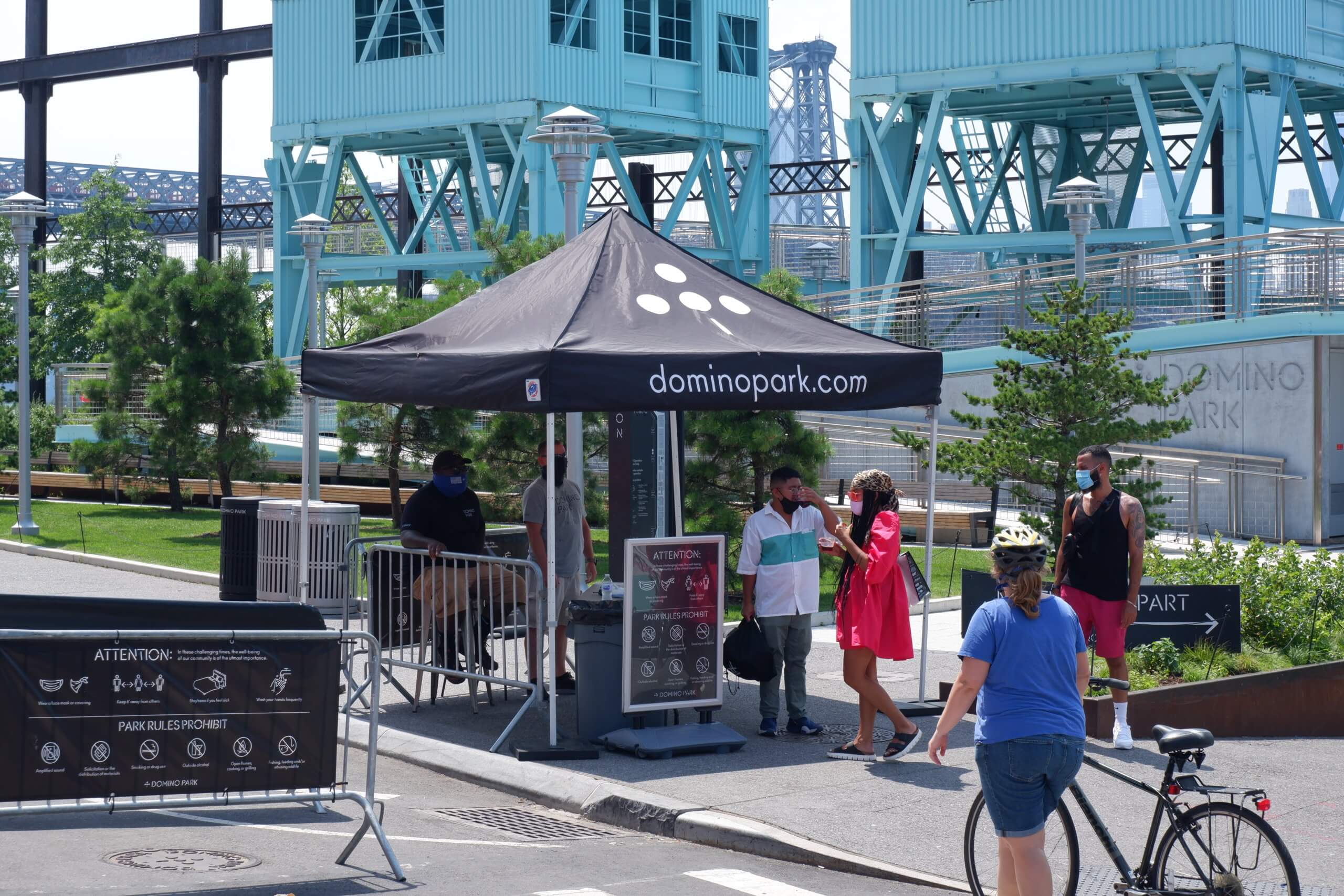
Several other visitors and nearby residents worried that the set up would intimidate people by turning it into gated green, counter to the developer’s pitch of it as a public amenity to make up for larger developments, according to a local politico.
“Everything that was negotiated in this deal is that this would be a public park and it’s being treated like a private space,” said Victoria Cambranes, a Greenpoint resident and candidate for the local City Council seat. “That’s what the tenets of architectural intimidation is about, building public spaces that intimidate people who don’t come from a certain class or are a certain race.”
The neighborhood’s sitting councilmember, Stephen Levin, did not return multiple requests for comment.
“It feels like heavily-policed, they’re escalating situations that don’t need to be escalated,” said a nearby resident of the park who only wanted to be named by her initials T.N.
The park’s director said that he didn’t want to create an exclusive atmosphere at all, but rather was looking to avoid confrontations with the police by increasing their own staff presence and stationing them at the entry points.
“It’s not our intention to create a club-like atmosphere. This is a public park,” said Michael Lampariello. “Our full intention is to deescalate any issues, we don’t want to involve the police.”
The lawn’s steward said they set up the extra security after a rash of fireworks, drinking, and late night partying along the north Brooklyn waterfront and that they were enforcing the same rules as at public parks, just at the entrance as opposed to inside the space.
“We’ve had a trash can lit on fire, ton of fireworks let off,” Lampariello said. “What I’ve personally observed across the north Brooklyn waterfront is just a blatant disregard of the rules, folks bringing in large amounts of liquor expecting to party all night.”
Lampariello said rowdy shindigs and fireworks have been an issue all along the north Brooklyn waterfront, including some firecrackers launching dangerously close to the state’s natural gas plant at River and N. First streets.
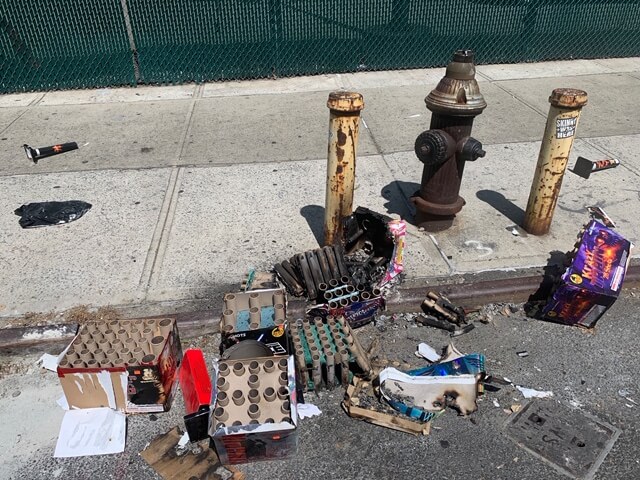
He shared email chains from local residents and property managers pleading with the area’s police precincts to increase patrols, with condo bigwigs saying they were being overwhelmed with concerns and complaints from residents and fearing a loss of property value.
“It feels like the 70’s as no one cares. This will not only put our people in danger if this does not stop but also will help devalue their properties if this continues,” wrote Resident Manager of 2 Northside Piers Condominiums Petrit Ujkaj. “My own wife cant [sic] even walk to the store around the corner as she is afraid she will get robbed after 9pm, Its [sic] very scary for a neighborhood like ours. We used to be safe here, and now we dont [sic] feel safe whatsoever due to no police presence.”
Under local zoning, developers along the Williamsburg waterfront have to allow access to the public in order to erect their tall towers. Many of the parks and esplanades are owned by developers and managed by the city’s Parks Department, but Domino is an exception in that it is fully owned and operated by Two Trees.
The spaces follow the same rules as public parks and if the city deems the private owners aren’t meeting their standards, officials can seek to rectify the issue, according to David Lombino, a spokesman for Two Trees, who added that he didn’t believe Domino was falling short of any governmental requirements.
“The city has the right if they deem that we’re not meeting their standards to seek some sort of remedy,” he said. “But I don’t think that’s the case.”
But one Williamsburg resident said that the guards stopped her and some of her friends from bringing in their own food, in one instance even telling her to buy food at the taqueria take-out inside the park instead.
“I picked up a cup of iced tea and a croissant from a coffee shop across the street and [the guards] were like, ‘No there’s no food or drink allowed in,'” said Lucille Jean Bruno. “They said, ‘If you want to go get lunch you can dump the stuff you have and you can buy food at Tacocina.”
Bruno added that she saw the guards disproportionately deny entry to people of color bringing in food or their own reusable water bottles.
“I was allowed in a couple of times and people of color weren’t allowed in,” she said. “I even went with friend who is a person of color and they weren’t allowed in because they had a S’well bottle”
Lampariello and Lombino said that food and drinks were allowed in the park and flatly denied Bruno’s accusations and committed to firing the guard in question if any proof of the alleged discrimination comes to light.
“It’s flabbergasting that someone would have suggested that without proof,” said Lombino. “If we found out that there was even the slightest suggestion of that, the person would be fired, and if true, hopefully they would be prosecuted and jailed.”
The spokesman said that Two Trees was proud of the diverse visitors to Domino Park, but conceded that the barriers threw the space’s private ownership into sharp relief.
“Domino Park is more diverse today than it has been in its two year history,” Lombino said. “It’s always been our intention to make that park as public as possible but clearly this issue has brought the distinction to the forefront that it is privately-owned.”
While the guards elicited many negative responses in a local Facebook group, visitors to the park over the weekend of July 18 had more mixed reviews of the new set up.
One Manhattanite echoed the criticisms, saying he was turned off by the bag check and chose instead to hang out in the adjacent Grand Ferry Park, a pint-sized city park.
“I hate it,” said Emre S. “There’s supervision and I don’t like when there’s so much supervision and steps just to get into a park to begin with.”
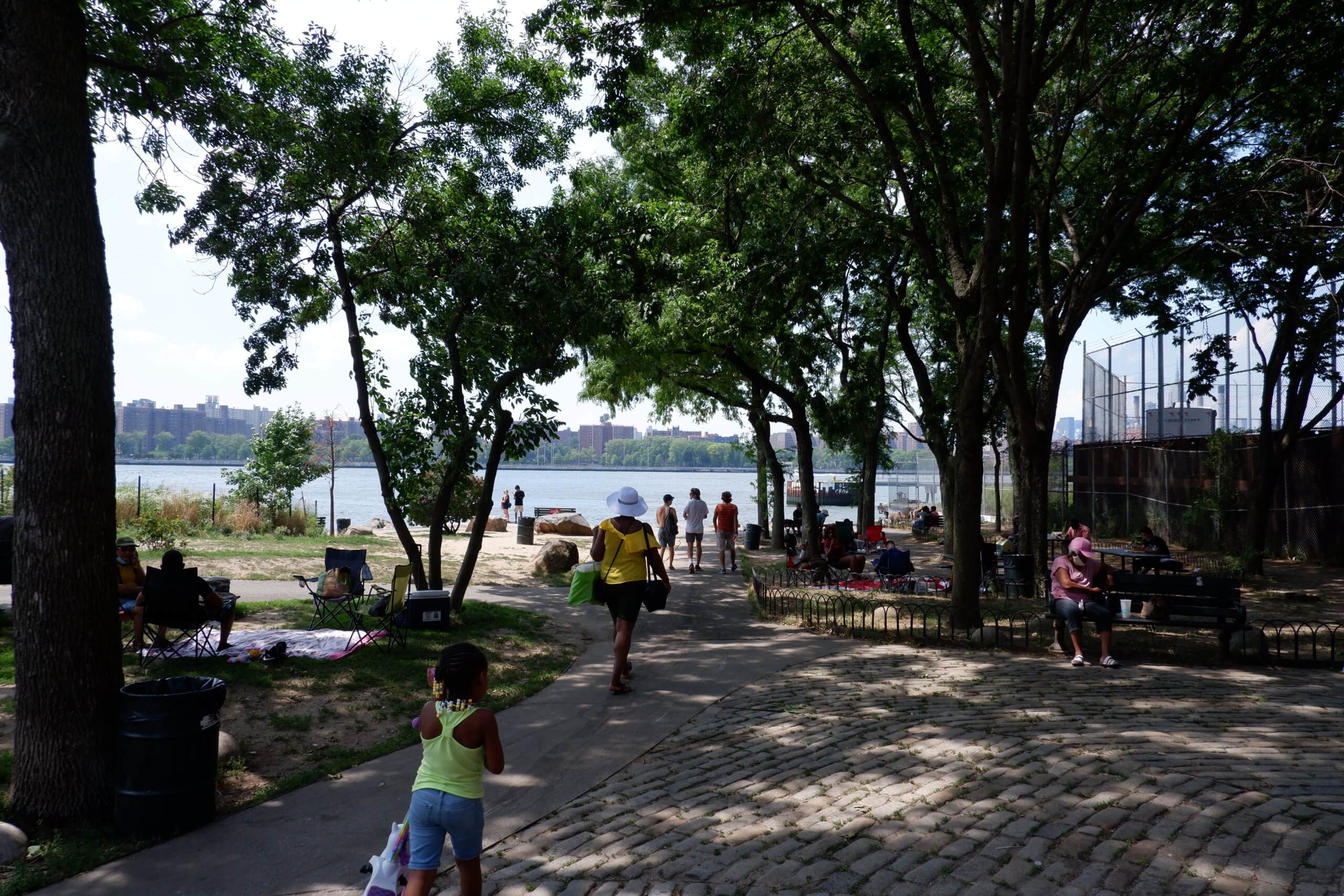
On the other hand, a Williamsburg mom said it made her feel safer, despite the guards searching her 18-year-old son’s bag upon entry.
“There’s always going to be negative feedback, but in the world that we live in, I feel safer with it than without it,” said Nancis Espejo.
One Fort Greene visitor said it was good for reminding visitors to wear masks to stem the spread of the coronavirus and that she shared local concerns about fireworks.
“They’re good because people that are not wearing masks should be wearing them,” said Yvette Norris. “Some people need to be searched, because they might bring alcohol or fireworks. We’ve had two weeks of firecrackers until 2:30 am in the morning.”


